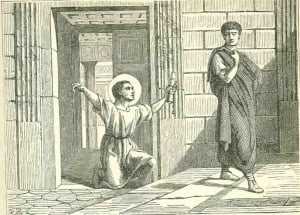A cup of coffee . . . and sandwich with Paul
I hope you’re enjoying our thoughts on the short book of Philemon. I ask for your comments and insights. That is how we learn best!
In verse 1, Paul identifies himself as a “prisoner of Christ Jesus.”
This humble term identifies Paul and is the first floorboard in building his relationship with the letter’s recipient, Philemon.
In verse 8 we’ll learn about the relationship problem this letter addresses.
Like any wise leader, Paul takes a breath in verses 1-7 to lay the groundwork for solving a problem.
Good leaders will also take some time to visit/discuss before they unload the problem. In my piney woods culture, that is best done over a good cup of Louisiana coffee. Whether it’s Community, Seaport, Folgers, Mello Joy, or heaven forbid Starbucks, the fellowship of the cup often lessens tension (in spite of the caffeine!) in relationships.
First century letters identified the writer and addressee at the front end. As in verse 1-2:
To Philemon our dear friend and fellow worker— 2 also to Apphia our sister and Archippus our fellow soldier—and to the church that meets in your home:
3 Grace and peace to you[a] from God our Father and the Lord Jesus Christ.
Notice Paul’s use of terms of endearment. There is an attitude of love and respect permeating this entire letter.
Apphia is thought to be Philemon’s wife and Archippus is probably their son. Some scholars believe Archippus may have been the actual/part owner of the escaped slave Onesimus.

Archippus is also mentioned again at the conclusion of Colossians, the sister letter that travels in the same mailbag as the personal letter that we call the book of Philemon.
Colossians 4:17 Tell Archippus: “See to it that you complete the work you have received in the Lord.”
I sense a gentle reminder that Arch needed a poke in the behind to finish something he’d agreed to.
In Philemon 1:2, Paul calls Arch “a fellow soldier.” Once again, I believe this title is meant to encourage this younger brother to “soldier on.” Keep going. Don’t quit.
In verses 3 and 4, Paul uses tender terms that are found in most of his letters.
3 Grace and peace to you[a] from God our Father and the Lord Jesus Christ.
He’s speaking a blessing/prayer over them. Who have you given this type of blessing to lately? Who has blessed you with their words?
4 I always thank my God as I remember you in my prayers, 5 because I hear about your love for all his holy people and your faith in the Lord Jesus.
Verse 4 is identical to Philippians 1:3. I thank my God upon every remembrance of you. Paul “smiles prayerfully” when he thinks of his friend back in Colossae. Phil. 1:3 is the verse inscribed on the grave of my beloved grandfather, Sid Plott. I smile and thank God when I think about this Godly railroad man.
Verse 5 is a hearsay verse. Paul’s heard from travelers that Philemon’s growing faith and love for Christian brothers and sisters. We think of hearsay and gossip in a negative connotation. Why don’t we spend time today sharing “Godly gossip.” The good news of how God is working around us in the lives of others.
6 I pray that your partnership with us in the faith may be effective in deepening your understanding of every good thing we share for the sake of Christ. 7 Your love has given me great joy and encouragement, because you, brother, have refreshed the hearts of the Lord’s people.
I like the conclusion of verse 7, “refreshed the hearts of the Lord’s people.” Our job, regardless of age or status, is to refresh.
Our job is to encourage. To urge on. To walk beside and speak words both of challenge and kindness.
Two days ago, I spent two hours with Jerry Masters. He is a dear friend who pastors First Baptist Jennings. A tall ex-college basketball player and Vietnam helicopter pilot, Jerry bleeds the love of Jesus in his words, actions, and smile.
Someone asked me about my day in Jennings and I said, “Any day I spend with Jerry Masters is a good day.”
Who are the three major refreshers /encouragers in your life?
1. ___________
2. ___________
3. ___________
In the book of Philemon, Paul is building a sandwich. He’s dealing with a meaty touchy problem: the reconciliation of a runaway slave and his owner.
Before getting to the first slice of thick ham, he puts down a piece of “light bread.”*
The first part of this sandwich reminds Philemon of the loving relationship of respect that he and Paul share. That’s what the first seven verses are in Philemon.
In dealing with problems, make a sandwich. Talk positively and lightly as you place the first piece of bread. Liberally spoon on a good layer of mustard and mayo.
Then deal with the problem. That is the meat of the sandwich.
At the end, flop another piece of light bread on top. It seals the deal.
Paul does it in each of his letters. It is often a prayer, personal greeting, reminder of gratitude.
The sandwich style of dealing with sandwiches stills works just as it did for the master chef in a Roman prisoner, the Apostle Paul.
*Southerners use the term “light bread.” Is there a “heavy bread”?
Tomorrow in Philemon 1:8, Paul cuts to the chase on the purpose of his letter.
The first piece of meat is laid on the bread.
Stay tuned.
Curt
 Creekbank Stories Curt Iles, Storyteller
Creekbank Stories Curt Iles, Storyteller


Curt,
Loved your words, i.e., sermon.
“Keep on Truckin'”
God Bless,
Larry